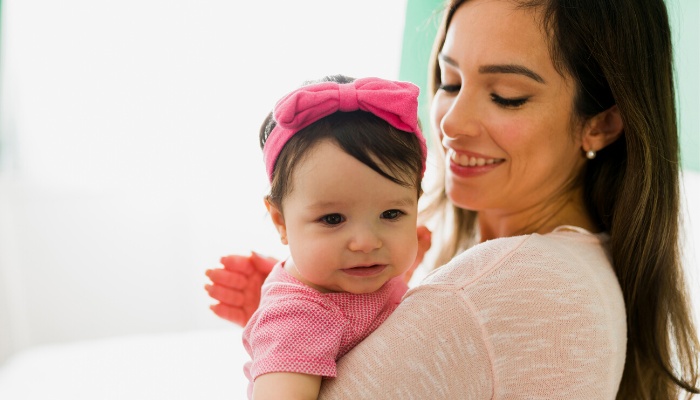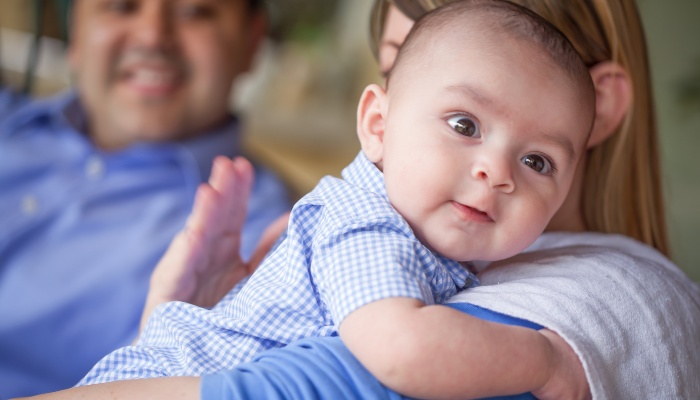It is crucial to burp your infant in the early stages of their life as it aids in alleviating discomfort caused by gas and promotes their overall comfort.
However, you won’t have to burp your baby forever. You will start to see signs when your baby is ready for you to stop.
You can usually stop burping your baby around 4-6 months of age. Babies will start burping on their own around this time, so you won’t have to help them as often or at all. Every child is different, but you can plan to give up burping duties well before the one-year mark.
Babies need to be burped in those early days, but you will start to see the signs that they can take care of this themselves at some point.
When It’s Safe To Stop Burping Your Baby
Burping is an important part of the feeding process when your baby is very young. It serves a purpose, but you won’t have to do it forever.
Why Burping Young Babies Is Important
Your baby can be uncomfortable and left with gas in his belly if you don’t burp him.
Burping your baby releases that gas and can also keep your baby from spitting up later when he is trying to rest. If you don’t burp your baby, all of you may suffer in those early days.
An uncomfortable baby doesn’t know how to tell you what is wrong. That’s why they will simply cry until you figure out what is going on and help them.
Burping your baby instead of letting them get to the point where their stomach is hurting will ensure better rest and peace of mind for everyone in your home.
When Can a Baby Burp on Their Own?
Most babies start burping on their own when they are around 4-6 months old. Some babies start as early as 2 months, but each baby develops at their own pace.
If your baby was premature or has gastrointestinal issues, they may require assistance with burping even longer.
When To Stop Burping Baby at Night
You can stop burping your baby at night when he is around 4-6 months old. After a feeding, try to burp your little one if he doesn’t burp on his own before putting him down to rest.
If he is able to burp on his own during or right after the feeding, don’t worry about burping him.
If you put your baby to bed and he can’t sleep or is fussy, you might want to try burping him to make sure gas on the stomach isn’t the reason he’s still awake and upset.
When To Stop Burping a Bottle-Fed Baby
For bottle-fed babies, you want to try to burp them until around the six-month mark. Bottle-fed babies usually take in more air through the bottle, no matter which one you buy.
That means that after 3-4 ounces, they need to burp so air is released and they can continue to eat comfortably.
Your child will start baby food when they are around six months old, and by that time, you shouldn’t need to burp them anymore.
When To Stop Burping Reflux Baby
A baby with reflux may need to be burped more often and for a longer period of time.
Talk to your doctor about when to stop burping your baby with reflux since you may end up going past the six-month mark.

Signs Your Baby No Longer Needs To Be Burped
Your baby might not need your help with burping if he can do the following:
- Eat from the bottle or the breast without being upset after the meal.
- Crawl or push off with his feet. These movements will help gas naturally move through your child’s system.
- Handle solid food. Don’t introduce food until your baby is six months old unless your doctor tells you differently.
Do Breastfed Babies Burp Less? Why?
Your breastfed baby may burp less than a bottle-fed baby. Breastfed babies tend to suck in less air when they nurse, and this can lead to fewer burps.
However, this is not a guarantee. Whether you breastfeed or bottle feed, you should try to burp your baby after every meal.
Tips for Burping Baby
There are a few tips that can make burping your baby easier for you both. Try the following if you feel your baby isn’t burping as much or as often as necessary to feel comfortable.
Try Different Positions
You can burp your baby with his head on your shoulder and his back straight. You gently rub and pat his back and hear a satisfying burp escape over your shoulder.
However, this position isn’t the best for everyone.
You can also put your baby over your legs, ensuring you are holding him well. Keep his head higher than his chest, and gently pat his back.
My babies personally liked to burp sitting up. I would put them in my lap facing forward, gently holding their chin so their head didn’t fall forward, and pat their back until they burped.
This sometimes led to spit-up on my feet, but it was effective.
Take Breaks
If you are bottle feeding, stop to burp your baby after 2-3 ounces instead of waiting until an entire feeding session is complete.
When I breastfed, I tried to burp when my baby switched sides so they weren’t stuffed when trying to burp for the first time.
This helped them enjoy their food and lessened the amount of spit-up I had to deal with since they weren’t overfed when I burped them.
Related Questions:
When Can Babies Have Water?
Babies don’t need to drink water until they are at least six months old.
Bottle-fed babies should only have water mixed with their powdered formula, and that water should be boiled and cooled before mixed with the formula.
When it comes to drinking water from a sippy cup, six months is how long you should wait.
Can a Baby Die From Not Being Burped?
Though not common, there are rare situations where not burping your baby can lead to death.
If you don’t burp your baby and then put him down to sleep, he may burp on his own and choke. The milk he burps up can also go into his lungs and cause suffocation.
There are stories of this happening, but it is not the norm.
Final Thoughts
You won’t have to burp your baby forever, but make it a priority when your infant is very young. As they age, they will start to handle this process without your assistance.
Kristy is the mother of four, including identical twins. With a background in education and research, she is constantly learning more about parenting and raising multiples. When she has spare time, she enjoys hiking into the woods with a great book to take a break.

